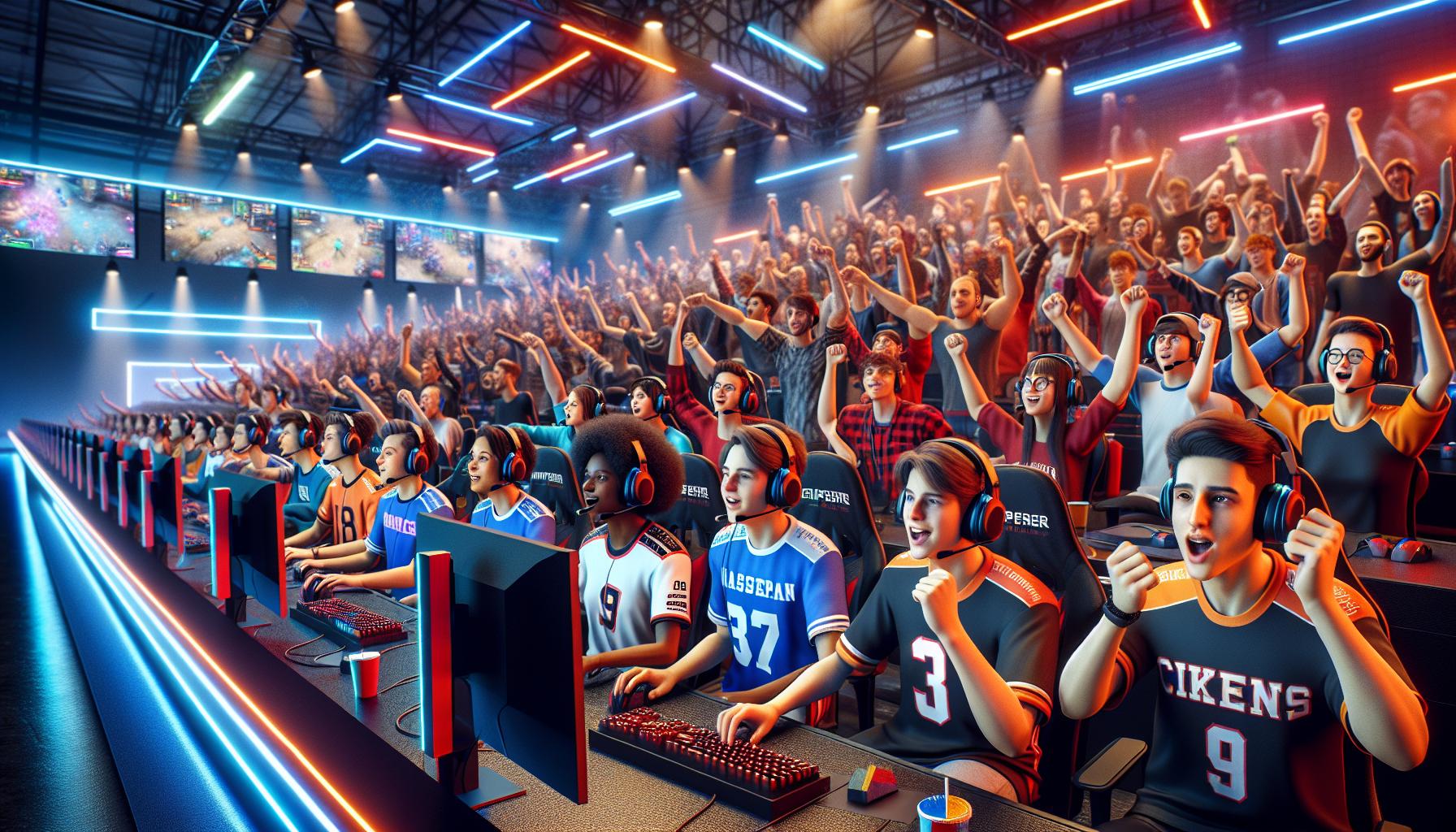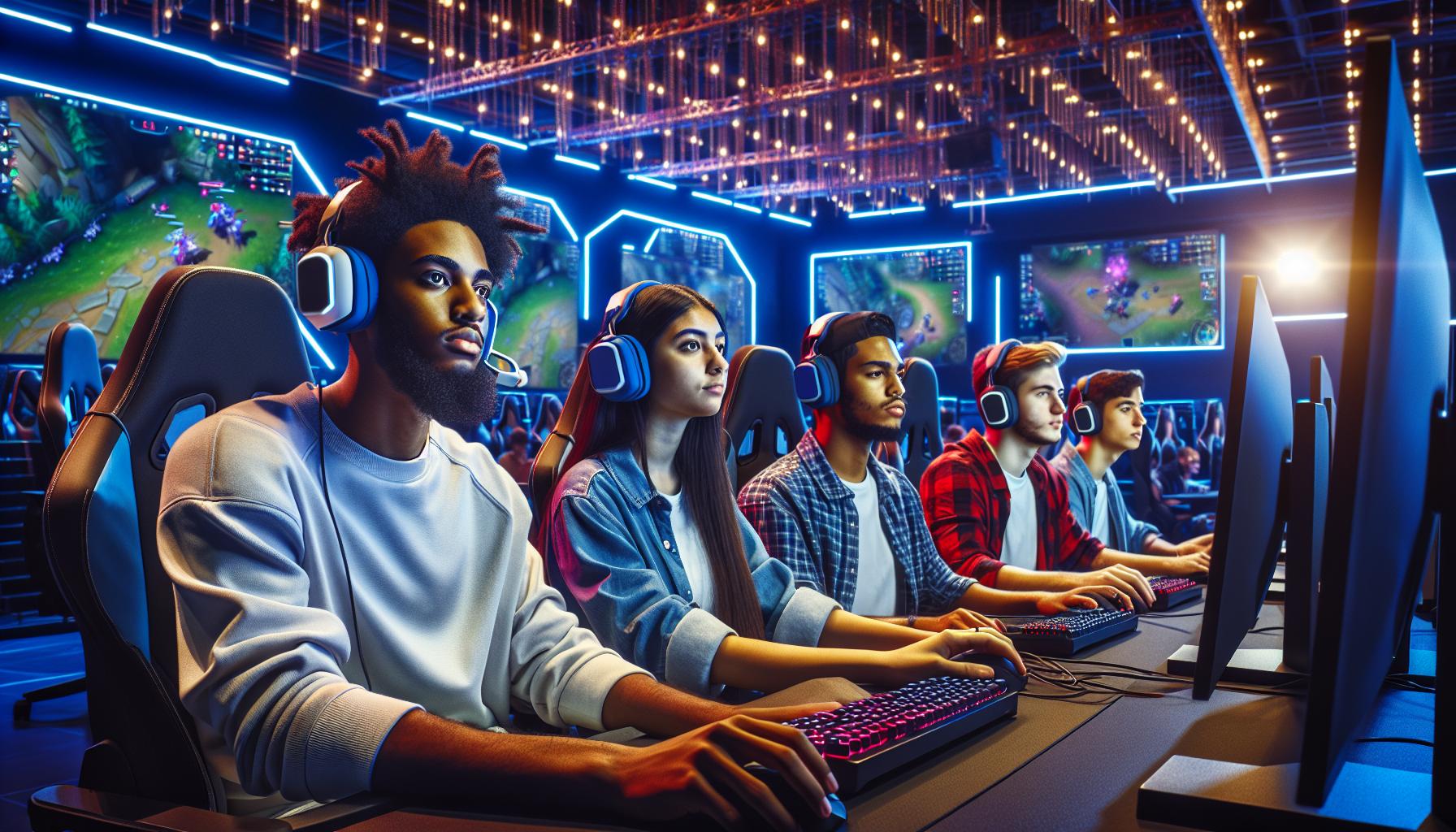Phone:
(701)814-6992
Physical address:
6296 Donnelly Plaza
Ratkeville, Bahamas.

In recent years, NCAA esports has transformed from a niche hobby to a powerhouse in collegiate athletics. As universities compete for top-tier gamers, the landscape of student competitions gets a thrilling upgrade. It’s not just about playing games anymore—it’s about strategy, teamwork, and school pride on a whole new level.
With scholarships on the line and tournaments drawing massive online audiences, esports offers students a chance to shine in ways traditional sports might not. Colleges are investing heavily, creating dedicated programs that rival any athletic department. Whether you’re a seasoned gamer or just curious about the boom, diving into NCAA esports reveals a dynamic and rapidly evolving arena where passion meets competition.
NCAA esports covers competitive video gaming among over 200 collegiate institutions. It’s grown rapidly, with universities like Ohio State and the University of Utah leading the way. Scholarships support more than 1,000 student-athletes, attracting top talent nationwide.
| Metric | Value |
|---|---|
| Participating Institutions | 200+ |
| Scholarships Offered | 1,000+ |
| Annual Tournaments | 50+ |
| Estimated Viewership | 10 million+ |
Universities invest in gaming arenas and training facilities, providing students with the resources needed for success. Teams compete in various genres such as strategy, first-person shooters, and MOBAs, exemplifying diverse gameplay. Sponsorships from major brands offer financial support, enhancing team operations and event hosting.
The NCAA sets regulations to maintain fair play and academic standards. Member schools follow eligibility criteria, ensuring athletes balance sports and studies. Online platforms host national competitions, enabling seamless participation across regions.
Esports integrates into campus life, fostering community and school pride. Events draw large audiences both in-person and online, showcasing the competitive spirit of collegiate gaming. Technological advancements shape the landscape, offering new avenues for engagement and expansion.

NCAA esports showcases a diverse range of games that highlight various skills and strategies. These titles attract top student-athletes and engage millions of viewers annually.
League of Legends stands out as a leading MOBA in NCAA esports. Counter-Strike: Global Offensive appeals to fans of tactical first-person shooters. Overwatch captivates players with its team-based strategies. Rocket League merges high-speed vehicular action with competitive sports elements. These titles drive significant participation and scholarship opportunities, fostering a robust collegiate esports environment.
Valorant is quickly gaining traction with its unique blend of tactical shooting and character abilities. Fortnite continues to expand its reach in NCAA esports through its dynamic battle royale format. Hearthstone introduces strategic card gameplay to the collegiate scene. These emerging games diversify NCAA esports offerings, attracting new student-athletes and broadening audience engagement.
NCAA esports operates under a comprehensive framework to ensure fair competition and uphold academic integrity. This structure governs the rules, standards, and operations of collegiate esports programs.
The NCAA establishes strict guidelines to maintain equitable competition in esports. It enforces rules on game selection, tournament formats, and scheduling to ensure consistency across all member institutions. Universities must adhere to standards regarding team size, coaching staff qualifications, and facility requirements. Additionally, the NCAA mandates adherence to academic policies, ensuring athletes balance their gaming commitments with educational responsibilities. Ethical conduct is emphasized, with clear codes of behavior for players and teams to prevent misconduct and cheating. Compliance with anti-doping regulations also forms a crucial part of the guidelines. These measures collectively promote a fair, respectful, and competitive environment for collegiate esports.
Student-athletes in NCAA esports must meet specific eligibility criteria to participate. Athletes must maintain a minimum GPA as defined by their institution and the NCAA. Enrollment in a degree program ensures players are active students pursuing education. Amateurism rules prohibit receiving payment beyond scholarships, preserving eligibility. Compliance with academic progress standards is required, avoiding excessive course withdrawals or failures. Transfer students must meet residency requirements before joining a new school’s esports team. Additionally, participants cannot engage in professional gaming activities that conflict with their collegiate standing. These criteria ensure that NCAA esports athletes are committed to both their academic and competitive pursuits.
NCAA esports participation delivers multiple advantages for student-athletes and universities. Scholarships support over 1,000 gamers, enhancing access to higher education and attracting top talent nationwide. Dedicated gaming facilities, such as those at Ohio State and the University of Utah, provide essential resources, boosting player performance and team success.
| Benefit | Details |
|---|---|
| Scholarships | Support over 1,000 student-athletes |
| Institutions | More than 200 collegiate programs |
| Tournaments | Over 50 annual competitions |
| Viewership | Estimated 10 million audience |
Competitive gaming cultivates strategic thinking and teamwork, valuable in both academic and professional arenas. With more than 50 annual tournaments and an estimated 10 million viewers, participants gain substantial exposure and high-pressure experience. Major brand sponsorships, including Intel and Red Bull, enhance team operations and offer networking opportunities.
Balancing esports and academics ensures student-athletes maintain a minimum GPA and progress toward their degrees. This balance fosters time management and discipline, benefiting academic and future career pursuits. NCAA regulations uphold fair play and academic standards, maintaining a respectful and competitive environment.
Universities investing in esports programs foster vibrant campus communities centered around gaming. Events draw large audiences both in-person and online, promoting school pride and student camaraderie. Diverse game genres, including strategy, first-person shooters, and MOBAs, cater to varied interests, encouraging broad participation. Participation opens career prospects in the growing esports industry, with roles in game development, event management, and marketing.
Overall, NCAA esports participation combines competitive gaming with academic achievement and personal growth, creating a dynamic educational experience.
NCAA esports faces several hurdles as it expands within collegiate athletics. Academic balance remains a primary concern. Student-athletes must maintain eligibility criteria, but the intensive training schedules can interfere with academic responsibilities. Universities strive to support gamers, yet balancing coursework and competition continues to challenge many participants.
Financial sustainability presents another significant issue. While over 1,000 scholarships support esports athletes, funding disparities exist compared to traditional sports. Smaller institutions may struggle to allocate resources effectively, limiting their ability to develop competitive programs. Additionally, the cost of maintaining gaming facilities and securing high-quality equipment adds financial strain.
Standardization of regulations across institutions is inconsistent. The NCAA enforces guidelines, but variations in team sizes, coaching qualifications, and facility standards create an uneven playing field. Lack of uniformity can hinder fair competition and complicate championship organization.
Mental health concerns are increasingly recognized within the esports community. The pressure to perform at high levels, coupled with long hours of practice, can lead to burnout and stress among student-athletes. Universities are beginning to address these issues, but comprehensive support systems are still developing.
Technological barriers also pose challenges. Ensuring all participants have access to reliable internet connections and high-performance hardware is essential for fair competition. Disparities in technology access can disadvantage certain teams, affecting overall competitiveness.
Recognition and legitimacy of esports as a true sport continue to be debated. Some critics question the physicality and traditional aspects of esports, impacting its acceptance within the broader athletic community. Gaining widespread recognition is crucial for securing additional support and resources.
Finally, ethical concerns related to fair play and cheating persist. As competitions grow, so does the sophistication of cheating methods. Implementing effective anti-cheat measures is vital to maintain integrity and trust in NCAA esports.
Addressing these challenges is essential for the continued growth and acceptance of NCAA esports, ensuring it can provide a balanced and fair environment for all student-athletes.
NCAA esports is set to expand significantly over the next decade. Increased investments from universities will lead to more dedicated gaming facilities and enhanced training programs. As technology advances, virtual reality and augmented reality are expected to become integral parts of collegiate competitions, offering immersive experiences for players and viewers alike.
The number of participating institutions is projected to surpass 300, reflecting the growing acceptance and legitimacy of esports in academia. Scholarships for esports athletes will likely increase, attracting a diverse pool of talent nationwide. This growth will foster greater competition levels, elevating the overall standard of collegiate esports.
Emerging game titles will diversify NCAA esports offerings, appealing to a broader audience and encouraging the inclusion of various gaming genres. Partnerships with major tech and gaming companies will provide essential resources, sponsorships, and innovative tools to support student-athletes and enhance tournament experiences.
Viewership for NCAA esports tournaments is expected to exceed 20 million, driven by enhanced streaming platforms and strategic marketing efforts. This surge in audience engagement will create more opportunities for revenue generation and brand collaborations, further solidifying esports’ place within collegiate athletics.
Regulatory frameworks will evolve to address the complexities of a rapidly expanding esports landscape. The NCAA will implement more comprehensive guidelines to ensure fair play, academic integrity, and mental health support for student-athletes. These measures will maintain a balanced environment where academic and competitive pursuits coexist seamlessly.
| Projection | Current Value | Future Estimate |
|---|---|---|
| Participating Schools | 200+ | 300+ |
| Scholarships Awarded | 1,000+ | 1,500+ |
| Annual Tournaments | 50+ | 75+ |
| Viewership | 10 million | 20 million |
Innovations in streaming technology and data analytics will enhance fan experiences and provide deeper insights into player performance. As NCAA esports continues to evolve, it will offer unparalleled opportunities for student-athletes, institutions, and the broader gaming community, ensuring its role as a pivotal element of collegiate sports.
NCAA esports has firmly positioned itself as a vibrant and essential facet of collegiate athletics, offering students unparalleled opportunities to excel in competitive gaming while pursuing their academic ambitions. Significant investments from universities in dedicated esports programs and state-of-the-art facilities reflect the growing acknowledgment of esports as a legitimate and influential component of campus life.
As NCAA esports continues to evolve, it promises even greater prospects for student-athletes and institutions alike. Balancing competitive fervor with academic excellence will be key to sustaining its growth and integrity. With ongoing innovation and expanding support, the future of NCAA esports shines brightly, poised to further enrich the collegiate experience and shape the landscape of higher education and competitive gaming for years to come.